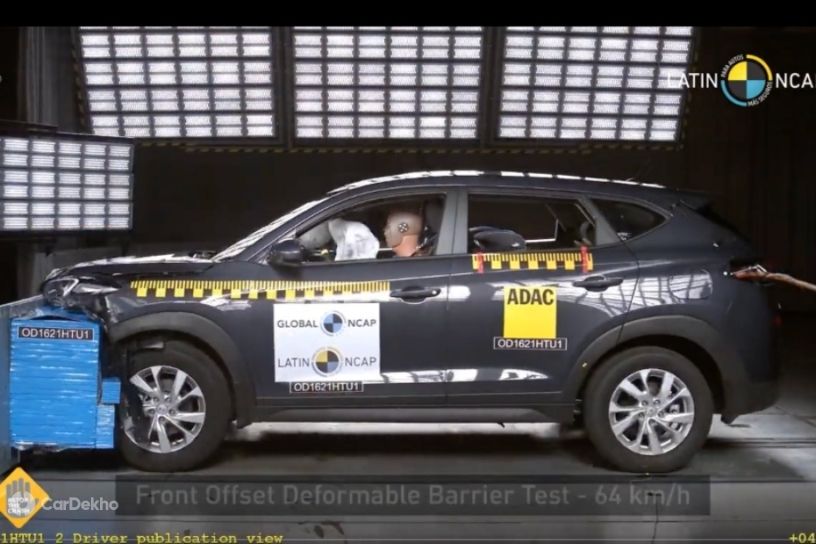2021 Hyundai Tucson Scores Zilch In Latin NCAP Crash Test
Published On Dec 13, 2021 12:46 PM By Tarun
- Write a comment
The crash-tested model is the one we have on sale in India right now

-
The Tucson scored 51 percent and four percent in adult and child occupant safety, respectively.
-
The tested model got dual front airbags, ABS with EBD, and ISOFIX child seat mounts in the rear seats as standard.
-
It was penalised for CRS (child restraint system) failures and not offering a three-point seatbelt in the rear middle seat.
-
Misses out on automatic emergency braking, lane change warning, and blind spot detection.
-
Tested model provided ‘good’ protection to driver and passenger’s head and neck and ‘adequate’ protection to the driver’s chest.
-
The bodyshell was rated stable and capable of withstanding more load.
Zero. That's how much the 2021 Hyundai Tucson scored in the Latin NCAP crash tests. And what compounds our problems is that the model tested is currently on sale in India. However, on the bright side, the new-gen SUV arrives in 2022, and it has already scored a full 5 stars in the Euro NCAP assessment.

The tested model got dual front airbags, ABS with EBD, and ISOFIX child seat mounts in the rear seats as standard. Electronic stability control (ESC), passenger seat belt reminder, and side airbags were optional. However, these safety features are standard on the India-spec Tucson. The crash-tested SUV also missed some ADAS features, including automatic emergency braking, lane change warning, and blind spot detection -- equipment considered necessary for a higher Latin NCAP score.
The SUV scored 51 percent in adult occupant safety and just four percent in child safety. Pedestrian safety and safety assist systems were rated at 50 percent and seven percent, respectively.
The SUV offered good protection to the driver and passenger's head and neck regions. While protection to the passenger's chest was good, the same was adequate for the driver's chest. The driver's knees showed marginal protection, while the same was good for the passengers' knees. The bodyshell was rated stable and capable of withstanding further load.
The Tucson offered good protection to the passengers' head, abdomen, and pelvis, while the dummy's chest received adequate side impact protection.

The poor score in child occupant safety was down to Hyundai not offering CRS (Child Restraint System) recommendations, and most of the CRSs tested for installation failing. It was also docked points for only offering a lap belt for the rear middle passenger.
The India-spec Tucson features six airbags, ESC, vehicle stability management (VSM), hill-start assist control, tyre pressure monitoring system (TPMS), electronic shift lock system, and a reverse parking camera as standard.
The Hyundai Tucson currently retails from Rs 22.69 lakh to Rs 27.47 lakh (ex-showroom Delhi). The next-gen SUV has already been spied testing in India and will demand a premium over the outgoing model.
Read More on : Tucson Automatic














